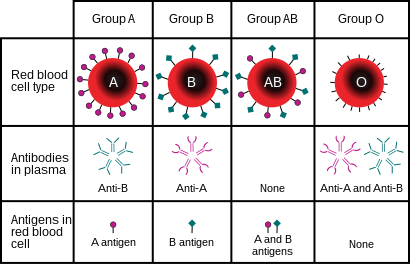A blood type (also called a blood group) is a classification of blood based on the presence or absence of inherited antigenic substances on the surface of red blood cells (RBCs). These antigens may be proteins, carbohydrates, glycoproteins, or glycolipids, depending on theblood group system.
Introduction
There are four main blood groups (types of blood): A, B, AB and O. Your blood group is determined by the genes you inherit from your parents.
Each group can be either RhD positive or RhD negative, which means your blood group can be one of the eight types shown below (see the Rh system).
What is blood?
Your body carries around four to six litres (7 to 10.5 pints) of blood. Blood is made up of red blood cells, white blood cells and platelets in a liquid called plasma.
Plasma is about 90% water, but also contains proteins, nutrients, hormones and waste products. Blood is made up of about 60% plasma and 40% blood cells.
Each type of blood cell has a specific role to play:
- red blood cells carry oxygen around the body and remove carbon dioxide and other waste products; they give blood its red colour
- white blood cells are part of the immune system (the body's natural defence mechanism) and help fight infection
- platelets help the blood clot (thicken) to stop bleeding
Antigens and antibodies
Your blood group is identified by antigens and antibodies in the blood. Antibodies are part of your body's natural defences against invading substances such as germs.
Antigens are protein molecules found on the surface of red blood cells. Antibodies are proteins found in plasma. Antibodies recognise anything foreign in your body and alert your immune system to destroy it.
The ABO system
There are four main blood groups defined by the ABO system:
- blood group A has A antigens on the red blood cells with anti-B antibodies in the plasma
- blood group B has B antigens with anti-A antibodies in the plasma
- blood group O has no antigens, but both anti-A and anti-B antibodies in the plasma
- blood group AB has both A and B antigens, but no antibodies
Almost half (48%) of the UK population has blood group O, making this the most common blood group.
Receiving blood from the wrong ABO group can be life threatening. For example, the anti-A antibodies in a recipient with group B blood will attack the group A cells if transfused to them. This is why group A blood must never be given to a group B person.
As group O red blood cells don't have any A or B antigens, it can safely be given to any other group.
The NHS Blood and Transplant website has more information about the different blood groups.
The Rh system
Red blood cells sometimes have another antigen, a protein known as the RhD antigen. If this is present, your blood group is RhD positive. If it's absent, your blood group is RhD negative. This means you can be one of eight blood groups:
- A RhD positive (A+)
- A RhD negative (A-)
- B RhD positive (B+)
- B RhD negative (B-)
- O RhD positive (O+)
- O RhD negative (O-)
- AB RhD positive (AB+)
- AB RhD negative (AB-)
About 85% of the UK population is RhD positive (36% of the population has O+, the most common type).
In most cases, O RhD negative blood (O-) can safely be given to anyone. It's often used in medical emergencies when the blood type isn't immediately known. It's safe for most users because it doesn't have any A, B or RhD antigens on the surface of the cells, and is compatible with every other ABO and RhD blood group.
Blood group test
To work out your blood group, your red cells are mixed with different antibody solutions. If, for example, the solution contains anti-B antibodies and you have B antigens on your cells (you are blood group B), it will clump together.
If the blood doesn't react to any of the anti-A or anti-B antibodies, it's blood group O. A series of tests with different types of antibody can be used to identify your blood group.
If you have a blood transfusion (where blood is taken from one person and given to another), your blood will be tested against a sample of donor cells that contain ABO and RhD antigens. If there's no reaction, donor blood with the same ABO and RhD type can be used.
Pregnancy
Pregnant women are always given a blood group test. This is because if the mother is RhD negative but the child has inherited RhD-positive blood from the father, it could cause complications if left untreated.
RhD-negative women of child-bearing age should always only receive RhD-negative blood.
















